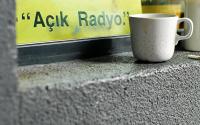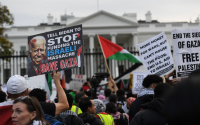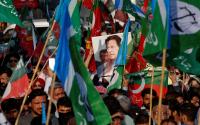Mohammed Dahlan2 July, 2002
Far from setting out a vision of peace, President Bush's plan for the Middle East points instead to an American decision to give up on the peace process. What has effectively been done is to transform a series of demands of the international community and international law into a series of demands to be made of Yasser Arafat. It also gives a new meaning to the word democracy, where our leaders are to be chosen by others.
The US administration is simply not prepared to confront the Sharon government under any circumstances. That was made clear by the fact that Bush has repeatedly asked Sharon to leave Palestinian cities and been ignored. The net effect will be to make the conflict worse, while providing no positive gains for either Palestinians or Israelis.
It is important to understand how we reached this bloody impasse. I took part in the Camp David talks in the summer of 2000 and was one of those who fought hardest to reach an agreement - indeed, I had to put up with accusations from others in the Palestinian delegation that I was too keen to reach a deal. But I was the first to refuse what had apparently been offered (apparently, because nothing was in writing). Contrary to subsequent claims, there was no serious offer made at Camp David, no solution floated that we would have regretted passing up.
The talks at Taba four months later, where there was a serious dialogue, were a different matter. If we had been offered at Camp David the kind of outline package we reached at Taba, we could have had a deal. But Ehud Barak, the Israeli prime minister, blocked the attempts to reach agreement because Israeli elections were two weeks down the line.
The errors go back further. There was a strategic mistake built into the 1993 Oslo agreement: to go for an interim, transitional deal, when the two peoples were ready for a comprehensive peace. The interim period allowed the Israelis to carry on as they had before, pressing ahead with settlements, closures and land expropriation, behaving like a classic occupier. There were also constant changes of leadership on the Israeli side, which led to the cancellation of agreements and understandings.
We paid the price on the ground, while the Islamists were able to build opposition to the process. Throughout the Oslo period, we took serious measures to prevent attacks by the opposition. It was the Palestinian Authority's duty to implement our part of the agreements and ordinary people supported us because there was hope for the peace process.
But the Islamists grew in the shadow of the failure of the peace process and the result was that people came to see us as providing security for Israel, rather than the Palestinians.
These were the conditions that gave rise to the intifada in September 2000. It was not our choice. The idea that the Palestinian leadership somehow planned the uprising is laughable. People's frustrations with the continuing occupation, closures, new settlements, postponements and economic squeeze were reaching boiling point. Three days before Sharon went to the El Aqsa in Jerusalem in September 2000, I told the Israeli foreign minister Shlomo Ben Ami and Clinton's envoy Dennis Ross in Washington that there was a risk of a new confrontation.
Even then, if Israel had not resorted to large-scale killings of demonstrators in the wake of the visit - seven were killed and 80 wounded on the first day, 12 were killed on the second - it could have been contained. I warned both Ben Ami and the Israeli chief of staff Shaul Mofaz not to resort to killing or there would be an explosion. Mofaz rang me after the second day and asked how we could bring things to an end. I told him: forget it, there's nothing to be done, let's talk next year.
Since then both the Barak and Sharon governments have dealt with us as enemies, destroyed our offices, killed or arrested the majority of our police officers, who had no connection with acts of terror, while continuing to demand that we prevent attacks. In such a situation, the authority is plainly unable to do so. Claims that the PA is inciting suicide attacks are nonsense. They are the product of indiscriminate collective punishments, siege, demolition of homes and relentless Israeli killings. This is what has driven otherwise non-political people to what they see as acts of revenge. When a family is wiped out in a refugee camp, women and children included, the remaining child goes and carries out a suicide attack. A year ago, the organisations were looking for people to carry out the attacks - now it is the other way round. We unequivocally condemn attacks on civilians. But this has become an earthquake.
Bush is now effectively demanding a coup d'état against Arafat, because the American administration says that even if he is re-elected in new elections, it will not deal with him. The result of Bush's speech is that the latest polls show nine out of 10 Palestinians say they would vote for Arafat. And as long as the Israelis are against Arafat, I'm with him - whatever reservations I have about some of the decisions that have been made. While the chairman is under siege, it would be wrong to criticise him - that would only serve Israel and America. There is no question of changing the leadership in these circumstances. If they try to expel or kill him - and anything is possible in the era of Bush and Sharon - they will come to regret it bitterly.
From our point of view, we need to push ahead with far-reaching reform, not to please the Americans - who want to do away with the PA and Arafat - but from the point of view of Palestin ian interests, to mobilise support for the PA and strengthen it. We need to change the faces of those in power, hold people to account, cut the number of ministers, reduce wasteful spending and cut back the number of security agencies. I was pressing for these reforms long before the US and Israel started to seize on them as an excuse not to make peace. Indeed, I stood down from my position as head of security in Gaza over the issue of reform.
The biggest obstacle to peace has been the Israeli mindset. They have understood peace solely in terms of their own domestic politics and disputes. That's why they thought they could expropriate more than 10% of Palestinian land, continue with settlements and then be amazed when we reject it. Our perspective is that our historic compromise was to accept 22% of pre-1948 Palestine - and still they want to divide it up. They are prisoners of their own dreams and illusions, as we were 30 years ago. If the issue is between our and their illusions, we will never resolve the conflict.
There is no reason why each side can't hold on to its dreams. But there is only one solution: two states living side by side - a Palestinian state along the June 67 borders, with its capital in Arab east Jerusalem, where the Palestinians can live in freedom, dignity and independence, with a fair resolution of the refugee problem - and an Israeli state in peace and security.
Mohammed Dahlan was until last month head of the Palestinian Authority's security organisation in Gaza. He is a member of the Fatah leadership and an adviser to Yasser Arafat.
http://www.guardian.co.uk/Archive/Article/0,4273,4452558,00.html






